Telangana State Road Transport Corporation
Telangana State Road Transport Corporation (abbreviated as TSRTC) is a state-owned corporation that runs bus transport services to and from the Indian state of Telangana. It was formed in 2014 by splitting the Andhra Pradesh State Road Transport Corporation.[2] Many other Indian metro towns in Andhra Pradesh, Tamil Nadu, Karnataka, Maharashtra, Goa, Odisha and Chhattisgarh are also linked with the services of TSRTC. It serves about 100.03 lakh passengers every day, having three zones and services operating through 97 depots.[3]
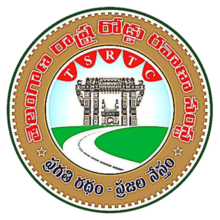 | |
| Industry | Bus Service |
|---|---|
| Founded | 2014 |
| Headquarters | Hyderabad, Telangana , India |
Area served | |
Key people |
|
| Services | Public Road Transport Service |
Number of employees | 49200(2019)[1] |
| Parent | Ministry of Road Transport, Government of Telangana |
| Website | www |
History
Road transport corporation in Telangana State was first established as NSRRTD (Nizam State Rail & Road Transport Department), a wing of Nizam State Railway in the erstwhile Hyderabad State, in 1932, with 27 buses and 166 employees. Andhra Pradesh State Road Transport Corporation (APSRTC) was established on 11 January 1958 in pursuance of the Road Transport Corporations Act 1950. Consequent upon bifurcation of Andhra Pradesh state into Telangana and residual Andhra Pradesh, TSRTC operated as a separate entity from 03.06.2015. The Government of Telangana has subsequently established Telangana State Road Transport Corporation (TSRTC), on 27.04.2016, under the Road Transport Corporation Act, 1950.
Divisions
TSRTC has three zones: Hyderabad Rural (HR), Greater Hyderabad (GHZ) and Karimnagar (KRMR). It is further subdivided into 13 regions and 25 divisions. It has a fleet of 10,460 buses, of which around 2000 are hired vehicles. TSRTC buses undertake operations on 3,653 routes.
Types of services
TSRTC operates a number of different kinds of services, both for urban transport as well as intercity and village transport.
Premium services
Air-conditioned buses are branded "Vajra", "Vennela", "Garuda Plus", "Garuda" and "Rajadhani" (previously known as Indra).
- Vajra
TSRTC started its new service named Vajra with tag line 'Mobility Redefined' and 'Service At Doorstep'. The goal of Vajra was to reduce the hassle of commuters having to travel to a bus station in Hyderabad in order to board an intercity service. Vajra bridged that gap by providing intercity services from various colonies in Hyderabad to Warangal, Nizamabad, Godavarikhani and Karimnagar city.[4]
- Vennela
Vennela is the most expensive service operated by TSRTC. Vennela translates to 'moonlight' in Telugu. These are Isuzu buses fabricated by JCB with sleeper berths arranged perpendicular to the body similar to a first-class train. Each berth has its own LED TV with pre-loaded movies. Value-added services include a 500ml water bottle, facial wipes, and a blanket. After the split from APSRTC, Vennela services were slowly losing traction and were eventually phased out. In its waning years, there were only three Vennela buses in TSRTC. All of them were operated to Bengaluru out of Hyderabad-3 depot in Musheerabad. Although not scrapped, all 3 buses are currently stabled and are no longer in regular service. A few other buses were downgraded into the Garuda brand.
- Garuda Plus GARUDA Plus
TSRTC operates multi-axle buses of Mercedes-Benz, Volvo, and Scania branded as Garuda Plus buses. Designed for superior ride quality, these buses have reclining seats, while a few older buses also have calf rests. There are two/three LED TVs in each coach with pre-loaded movies depending on the make. As in Vennela, passengers are given a 500ml water bottle, a blanket and a packet of facial wipes. TSRTC operates Garuda plus buses on intercity and interstate routes between urban centers such as Khammam-Bengaluru, Hyderabad-Adilabad, Hyderabad-Karimnagar, Hyderabad-Mumbai, Hyderabad-Vijayawada, Hyderabad-Bengaluru, Nizamabad-Bengaluru, Nizamabad-Tirupati, Warangal-Bengaluru, Godavarikhani-Bengaluru, Karimnagar-Bengaluru, Hyderabad-Pune, Hyderabad-Chennai, Hyderabad-Nagpur.
- Garuda
TSRTC operates bi-axle buses of Volvo and Isuzu make branded as Garuda. There have been no additions to the fleet since 2009 apart from a few Vennela which were downgraded as Garuda. This class of service is being phased out. Designed for superior ride quality, these buses have reclining seats. As in Vennela, passengers are given a 500ml water bottle, a blanket and a packet of facial wipes. Some popular Garuda routes are Hyderabad-Warangal and Karimnagar, Vijayawada.
- Rajadhani
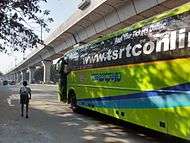 Rajadhani
Rajadhani
TSRTC operates AC buses built on Ashok Leyland's 12M Viking chassis branded as Rajadhani. Introduced in 2011, these buses were earlier branded as Indra. Rajadhani buses act as a bridge between mid-level service "Super Luxury" and premium service "Garuda Plus". These buses are generally operated to state capital Hyderabad from various district headquarters. These are also operated on high-frequency long-distance routes. Only water bottles are provided in these buses.
Mid-level services
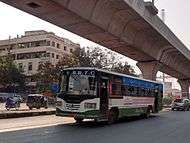
Mid-level services are branded "Super Luxury", "Deluxe" and "Express".
- Super Luxury
These are non-air conditioned 2+2 push back services which are run from major cities. These are video coaches in which various movies are played. Most of the buses are of Ashok Leyland, Tata, Eicher etc.
- Deluxe
These are non-air conditioned 2+2 services which are run as intercity services. The color of a Deluxe bus is violet. Most of the buses are of Ashok Leyland, Tata, Eicher, etc.
- Express
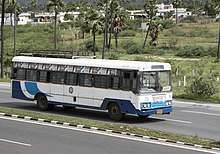
These are non-air conditioned 3+2 services which are run as intercity services. The color of an Express bus is light blue and dark blue. Most of the buses are of Ashok Leyland, Tata, and Eicher.
TSRTC runs city route buses in urban areas like Suryapet, Mahabubnagar, Siddipet, Godavarikhani and Khammam.
Entry-level services
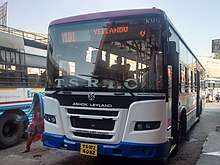
Entry-level ordinary service is branded as "Pallevelugu" and "Mini-Pallevelugu". These buses constitute the majority of TSRTC's fleet, and are used to provide connectivity to villages and small towns. Pallevelugu are typically used on short routes connecting villages and small towns to larger towns.
Urban services
City buses in Hyderabad and Warangal are also branded in a similar fashion. Air-conditioned city buses are branded "Metro Luxury" and "City Sheetal". The city buses to Rajiv Gandhi International Airport (RGIA) are branded "Pushpak". Mid-level city services are branded "Metro Deluxe" and "Metro Express" whereas the entry-level "Ordinary" buses are not given any name but are commonly referred to as a "City Bus". These service categories should not be confused with local arrangements like "Merupu", "Trisul" and "Ramabanam".
Special Hire Services
TSRTC also provides buses for special hire to individuals and organisations for any purpose such as tours, pilgrimage, marriage transport, excursions etc.[5]. All kinds of buses are available for Special Hire, each with their own tariff rate.[6]
Cargo Services
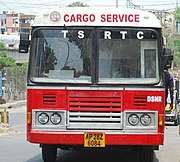
In June 2020, TSRTC launched its Cargo Services in Telangana state.[7] These cargo vehicles were refabricated from older, retired passenger buses, and were launched with the goal of transporting governmental goods such as books, departmental materials, question papers and answer sheets for educational institutions and other goods being supplied by the government. Each depot has been supplied with 2 cargo vehicles, and are available for hire by private parties as well.
During the COVID-19 crisis, TSRTC cargo vehicles were used extensively to transport pharmaceuticals and medicinal supplies, as well as farm goods, groceries, and other logistics for the government.[8]
Awards and achievements
Accidents and incidents
- On 11 September 2018 India's worst bus tragedy took place in Telangana when a bus belonging to Jagtial depot was jam-packed with 88 passengers swerved off a ghat road and hurtled 30 feet down onto a valley at Sanivarampet killing 56 people and injuring 32 on board. The mishap occurred when bus driver Srinivas lost control over the wheel near Sanivarampet. Srinivas reportedly failed to slow down the vehicle as he failed to see a speed-breaker. When the bus hit the bump at high speed, Srinivas lost control over the wheel, resulting in the mishap. The vehicle rolled four times before falling onto the valley.[13]
Protest
48000 employees stayed off work for a period of 52 days starting 5 October 2019, protesting against hostile working environments, arbitrary pay cuts and loan denials, unsanitary workplaces, long working hours, as well as asking for a merger of the corporation into the state government.[14]
The transport strike was met with solidarity from other unions such as the Teacher's Union, Employees Union, TNGO, TS TRANSCO etc.[15]
The strike was met with brutal suppression from the state government and Telangana Police, who fired non lethal rounds into crowds of protestors, as well as taking a large number of them into custody.[16]
Unable to continue amid the brutal suppression, the workers were finally forced into calling off the strike on November 25.[17]
References
- "TSRTC AT A GLANCE".
- Krishnamoorthy, Suresh (16 May 2014). "It will be TGSRTC from June 2". The Hindu. Hyderabad. Retrieved 28 January 2015.
- "TSRTC Profile". tsrtc.telangana.gov.in. Retrieved 15 August 2020.
- https://www.tsrtc.telangana.gov.in/HowtoCharteraBus.php
- https://www.tsrtc.telangana.gov.in/TariffTable.php
- https://twitter.com/drusawasthi/status/1261934433650667526
- TSRTC bags mileage award
- TSRTC bags two major awards
- TSRTC gets award for excellence
- TSRTC bags award for the second time
- "57 dead, 32 hurt in India's worst bus tragedy in Telangana - Times of India ►". The Times of India. Retrieved 5 December 2018.
- https://www.thenewsminute.com/article/explainer-why-4-rtc-employees-have-died-and-48000-are-strike-telangana-111420
- https://www.thehindu.com/news/national/telangana/bouyed-by-tngo-support-tsrtc-jac-to-intensify-strike/article29693923.ece
- https://timesofindia.indiatimes.com/videos/city/hyderabad/tsrtc-strike-police-take-agitators-into-custody-in-telangana/videoshow/71661682.cms
- https://scroll.in/latest/944874/telangana-transport-employees-strike-called-off-after-52-days